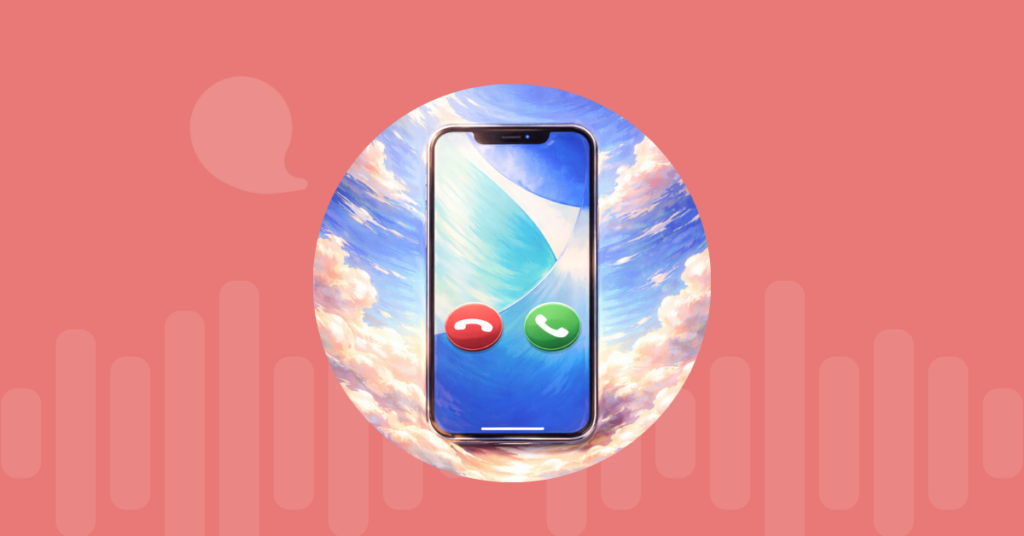
Table of contents
You’ve probably heard the term VoIP, but you might need to realize its full potential. Those four letters represent technology that has completely transformed how businesses and consumers make phone calls.
In this post, we’ll explain VoIP numbers, how they work, their benefits, and how they differ from traditional phone numbers.
What is a VoIP number?
Traditional phone calls require a landline, and physical phones are tied to a specific location, creating a specific area code. VoIP (Voice Over Internet Protocol) changes the game by allowing voice phone service from any location using an Internet connection and common devices like, VoIP phones, smartphones or tablets.
You can also make these virtual calls using laptops, desktop computers, and even landlines (with the correct converter).
VoIP uses internet protocol to make phone calls over a standard Internet connection. In other words, we’re now free of traditional phone lines.
To use VoIP, you need a virtual phone number, also known as a VoIP number. A VoIP number is just like a regular phone number but assigned to a user, not a specific phone line.
VoIP numbers look and work the same as any other number. You dial them like any other number, and no special training is needed. They’re accessible to everyone.
The use of VoIP in small and medium-sized businesses has even more advantages, as this technology allows the implementation of PBX functions in the cloud at a very affordable cost.
How is a VoIP number used?
To make a VoIP call, you need a good Internet connection and a device capable of making Internet calls.
Getting started is easy: companies get a VoIP number and install the software on their devices.
When ready to make a call, you use the software like any other phone call. You could also use a special VoIP phone resembling a regular landline phone.
Setting up a VoIP number is straightforward. Check out this example from VoIPstudio in this video:
Unlike conventional services that need specific routing, VoIP numbers need a broadband connection.
Practical uses of VoIP numbers
How businesses use VoIP for communication
Businesses use VoIP numbers to streamline their communications. With VoIP, companies can make and receive calls over the Internet, making communication efficient and flexible.
Common uses include:
- Customer service: VoIP helps businesses manage customer service calls effectively, often integrating with CRM systems for better management.
- Remote work: Employees can use VoIP numbers from anywhere, supporting remote and hybrid work environments.
- Internal communication: VoIP enables seamless internal communication through voice calls, video conferencing, and instant messaging.
Benefits for small, medium, and large enterprises
- Small businesses: VoIP offers cost-effective solutions with low upfront investment. Features like call forwarding, auto-attendant, and voicemail-to-email enhance professionalism and customer service.
- Medium enterprises: VoIP is scalable and flexible, making it easy to add or remove lines as the business grows. Integration with other business tools improves efficiency and collaboration.
- Large enterprises: VoIP offers significant cost savings on international and long-distance calls. It supports large-scale communication needs with high reliability, robust security measures, and advanced call management features.
Difference between VoIP numbers and regular phone numbers
There are several key differences between VoIP numbers and traditional phone numbers:
-
Location independence
- VoIP number: This number is not tied to a specific location. You can use it anywhere with an internet connection, ideal for remote work and international travel.
- Traditional phone number: This number is linked to a specific phone line and location. You must be at that location to use it.
-
Technology
- VoIP Number: This number uses Internet protocol to transmit voice data as digital packets. It requires a stable internet connection but allows for advanced features and integration with digital services.
- Traditional Phone Number: Uses analog signals through physical phone lines, limiting flexibility and features compared to VoIP.
-
Features
- VoIP number: This number comes with advanced features like voicemail-to-email, call forwarding, video conferencing, and integration with other tools.
- Traditional phone number: Usually offers basic calling features, with additional services at extra costs.
-
Scalability
- VoIP number: Easily scalable, making adding or removing lines and adjusting services simple. Great for growing businesses.
- Traditional phone number: Scaling up can be more complex and costly, requiring physical infrastructure changes and additional lines.
-
Multiple devices
-
- VoIP numbers: can be attached to multiple devices which makes it possible to use them in unique ways. Accordingly, users can make a voice call from a hard phone, their smartphone or computer using the same number.
- Landline numbers: are typically tied to a specific device like a home phone, office phone or any other landline instrument.
Such a system allows for great flexibility for users, especially in a business context. A VoIP phone number is more suited to how we work and live in today’s world.
With voice calling over the Internet, users can choose a phone number with any area code.
Expert tip
Explore the benefits of VoIP to enjoy seamless communication from any location, lower your phone bills, and leverage cutting-edge features that improve efficiency.
Advantages of a VoIP number
The way landline numbers are used hasn’t changed much over the last several decades. People make calls, send and receive voicemail and maybe use a few extra features like caller ID.
A VoIP number, however, has many advantages for users and for companies, as they are designed through their software to make the processes easier.
Having the right usability will save the consumer a lot of time in their actions. Some VoIP number advantages are listed below:
1. Great flexibility
This is one of the biggest advantages of a VoIP number. Since we have many devices on which to use it, it will offer us a mobility and usability unthinkable with other fixed devices.
- Businesses get enterprise-class features at an affordable cost, like conferencing, instant messaging, music on hold, ACD queues, and more.
- With VoIP you can easily add new numbers in a matter of minutes and use them for personalized campaigns only for as long as you need.
Here is a full guide on VoIP for small businesses and what you need to get started.
2. Cost savings
One of the primary advantages of using VoIP numbers is the significant cost savings they offer compared to traditional phone services. Here are some key points highlighting these savings:
Lower costs compared to traditional phone services
VoIP (Voice over Internet Protocol) services are generally more affordable than conventional landline or mobile phone services. Traditional phone services often involve various charges, including setup fees, maintenance costs, and high monthly bills. In contrast, VoIP services typically have:
- Lower monthly fees: VoIP providers often offer competitive pricing plans with lower monthly fees, which can be particularly beneficial for businesses needing multiple lines.
- Minimal setup costs: With VoIP, there is usually no need for expensive hardware installations or extensive infrastructure. Most setups only require an internet connection and compatible devices, reducing the initial investment.
- Bundled features: VoIP services often come with a range of features bundled at no extra cost, such as voicemail, call forwarding, and conference calling. These features would typically incur additional charges with traditional phone services.
Savings on long-distance and international calls
One of the most significant cost-saving aspects of VoIP is the reduced expense of long-distance and international calls. Traditional phone services can be prohibitively expensive for these types of calls due to per-minute charges and other fees.
VoIP, however, offers:
- Flat-rate pricing: Many VoIP providers offer flat-rate pricing plans that include unlimited long-distance and international calls. This allows businesses and individuals to make extensive calls without worrying about escalating costs.
- Low per-minute rates: For plans that charge by the minute, VoIP services usually offer much lower rates compared to traditional phone companies. This can lead to substantial savings for businesses with frequent international communication needs.
- Free VoIP-to-VoIP calls: Calls made between VoIP numbers, even internationally, are often free. This is particularly advantageous for businesses with remote teams or international clients using the same VoIP service.
By switching to VoIP, both businesses and individuals can significantly reduce their communication costs, making it a financially sound choice for modern telecommunications.
3. Enterprise-class phone service features
VoIP phone service allows businesses of all sizes to take advantage of enterprise-class VoIP phone features at an affordable cost. These are some of the most common features:
- ACD queues – Directs inbound traffic to the appropriate queues by creating customized ACD queues.
- Conferencing – Making conference calls using VoIP is as simple as creating any number of virtual conference rooms. In addition, each conference call supports an unlimited number of participants.
- Instant messaging – Virtual phone service providers support free instant messaging between devices.
- Music on hold – Create a better customer experience by customizing musical interludes for their hold time.
- Call recording – Record and store company phone calls for future reference.
4. Make voice calls using any device
VoIP phone numbers operate on networks that rely on IP technology – the same networks that are used to deliver Internet access.
A VoIP numbe can be used to make voice calls from a variety of devices, such as a desktop IP phone, an analogue fixed line device (with a converter) or an application on a smartphone or tablet.
The experience is consistent across all devices, and the person on the other end of the line sees the same number on their caller ID.
5. Incoming calls can ring to multiple devices
Most VoIP phone systems include a feature wherein incoming calls can ring multiple devices simultaneously or one after the other depending on how the service is configured.
The feature may have different names on different services but is commonly referred to as ‘multi-device ring’ and ‘find me follow me’ respectively.
Thus, any person can be reached through a phone call even if the caller has no idea where they are or which device they might be calling from.
Businesses can significantly improve customer service by making sure calls are answered regardless of where employees may be located. With traditional phone lines, callers would end up in voicemail if they couldn’t reach someone. With virtual numbers, voicemail becomes the last resort as the user will be reached sooner or later.
6. Number mobility
Transferring phone service to a new location is hassle-free with a virtual phone number. There is no need to change phone numbers or suffer through moving a hard phone number to a new address.
Is it difficult to switch to a VoIP number?
Sometimes you must make tough decisions. Upgrading to a new technology or switching suppliers are good examples. These decisions need a lot of planning and preparation. Switching over to VoIP doesn’t have to be a tough decision. After all, the new technology offers many benefits at a fraction of the cost of older systems.
One of the most common queries is – what happens to all my numbers? Your phone number is visible everywhere, from your advertising to the company letterhead. Your customers are familiar with it and many have even memorized it. It is the first point of contact between your business and the world.
So, what happens if you change to VoIP? Can you take your number with you or not?
Switching to VoIP doesn’t have to be tough. Here are the steps typically involved in the process:
- Choose a VoIP Provider
- Sign Up for Service
- Select a Number
- Set Up VoIP Hardware or Software
- Configure Settings
- Test the Service
- Inform Contacts
VoIP number portability
VoIP is set to become the dominant communication platform for the future.
Therefore, it’s not surprising that VoIP service providers are subject to number portability rules.
- If a user cancels service, the provider has to port out their number.
- A vendor cannot refuse the request even if the user has an outstanding balance or other fees on their account.
VoIP numbers offer portability, meaning they can go with the user no matter where they move.
This level of portability is especially beneficial to businesses not wanting to lose loyal customers who are used to dialing the old number.
There will be no need to update marketing materials, the company website or other communication to reflect new numbers. The old number will continue to function as usual.
Why You Should Try a VoIP Number with VoIPstudio?
Business communication needs are getting more demanding, requiring more powerful features to keep clients happy.
Communication between team members is also critical. That’s why we need fast, effective, and adaptable communication tools.
Check out this video to see what VoIP can do for you with a virtual number:
Here are some reasons why you should get a VoIP number with VoIPstudio:
- Cost savings: VoIPstudio offers lower rates than traditional phone services, especially for long-distance and international calls.
- Flexibility and mobility: With VoIPstudio, you can use your phone number from anywhere with an internet connection, perfect for working from home or on the go.
- Advanced features: VoIPstudio includes business features like conference calls, call forwarding, instant messaging, and voicemail-to-email at no extra cost.
- Scalability: Adding or removing lines and adjusting services as your business grows is easy.
- User-friendly: Setting up and using VoIPstudio is straightforward, with no need for advanced technical knowledge.
VoIPstudio offers a 30-day free trial to experience all these benefits without commitment.
Frequently asked questions about ‘What is a VoIP number’
What is a VoIP number and how does it work?
A VoIP (Voice over Internet Protocol) number is a telephone number that uses the internet to make and receive calls instead of traditional phone lines.
It works by converting voice signals into digital data packets, which are transmitted over the internet and then converted back into voice signals on the receiving end.
This allows for calls to be made from any internet-connected device, such as a computer, smartphone, or VoIP phone.
What are the benefits of using a VoIP number?
- Cost savings: VoIP services are typically more affordable than traditional phone services, especially for long-distance and international calls.
- Portability: VoIP numbers are not tied to a specific location, so you can use the same number anywhere with an internet connection.
- Advanced features: VoIP services often come with features like voicemail-to-email, call forwarding, video conferencing, and more.
- Scalability: It’s easy to add or remove lines and adjust services as your needs change.
- Integration: VoIP can integrate with other digital services and tools, improving overall communication and productivity.
How do I get a VoIP number?
- Choose a Provider: Research and select a VoIP service provider that fits your needs and budget.
- Sign Up: Sign up for the service on the provider’s website, choosing a plan and providing necessary information.
- Select a Number: Choose a new VoIP number from the provider or request to port your existing phone number to the VoIP service.
- Set Up: Follow the provider’s instructions to set up any necessary hardware or software on your devices.
- Activate: Once everything is set up, activate your service and start using your VoIP number.
What equipment do I need for a VoIP number?
- Internet Connection: A stable and fast internet connection is crucial for good call quality.
- VoIP Adapter: If you want to use a traditional phone, you’ll need an adapter to connect it to the internet.
- VoIP Phone: Alternatively, you can use a VoIP-specific phone that connects directly to your internet network.
- Computer or Smartphone: You can also use software-based VoIP services on your computer or smartphone, often through an app provided by your VoIP service provider.
- Headset: For better call quality, especially on computers, a good-quality headset with a microphone is recommended.
Are VoIP numbers reliable and secure?
- Reliability: VoIP services are generally reliable, but their performance depends on the quality and stability of your internet connection. A strong, consistent internet connection is essential for maintaining high call quality.
- Security: VoIP services can be secure, but it’s important to choose a reputable provider that offers encryption and other security measures to protect your calls and data. Additionally, using strong passwords and keeping your software up to date can help enhance security.
Conclusions
VoIP numbers bring a wealth of enterprise-class features to businesses of all sizes. There is no need for a significant upfront investment to get started. Companies can get started with virtual calling using their Internet connection and existing equipment.
Learn more about how you can get started with VoIP for your business and take advantage of a 30-day free trial.
More from the blog
Want to improve your business communication?
Unlock enterprise-class call center power at affordable prices – no hardware, no delays, no surprises!







